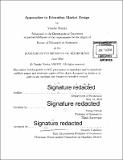Approaches to education market design
Author(s)
Narita, Yusuke
DownloadFull printable version (19.81Mb)
Other Contributors
Massachusetts Institute of Technology. Department of Economics.
Advisor
Parag Pathak.
Terms of use
Metadata
Show full item recordAbstract
This thesis consists of essays about how to improve education markets through analyzing data generated by such markets. In chapter 1, I start with looking at how families decide which school to attend in a school choice system. Though such systems are designed assuming that families make well-informed choices upfront, I use data from NYC's high school choice system to show that families' choices change after the initial match as they learn about schools. I develop an empirical model of evolving demand for schools under learning, switching costs, and demand responses to prior assignments. The estimates suggest that there are even more changes in underlying demand, undermining the welfare performance of the initial match. To alleviate the cost of demand changes, I investigate dynamic mechanisms that best accommodate choice changes. These mechanisms improve on the existing discretionary reapplication process. In addition, the gains from the mechanisms dramatically change depending on the extent of demand-side inertia caused by switching costs. Thus, the gains from a centralized market depend not only on its design but also on demand-side frictions (such as demand changes and inertia). In chapter 2, I turn to education production after students start attending schools. In centralized school admissions systems, rationing at oversubscribed schools often involves lotteries on top of preferences of students and schools. This random assignment is extensively used by empirical researchers to identify the effect of getting in a school on outcomes such as test scores. I theoretically study whether a popular empirical research design extracts a random assignment as intended, providing a condition under which the research design successfully extracts a random assignment. Chapter 3 (with Atila Abdulkadiroglu, Josh Angrist and Parag Pathak) considers the complementary question of how best to use the lottery-generated variation for impact evaluation. We develop easily-implemented strategies that fully exploit the random assignment embedded. We apply these methods to find large achievement gains from charter school attendance in Denver. By analyzing test-score consequences, chapters 2 and 3 complement chapter l's analysis of welfare/happiness consequences of school attendance.
Description
Thesis: Ph. D., Massachusetts Institute of Technology, Department of Economics, 2016. Cataloged from PDF version of thesis. Includes bibliographical references (pages 199-210).
Date issued
2016Department
Massachusetts Institute of Technology. Department of EconomicsPublisher
Massachusetts Institute of Technology
Keywords
Economics.